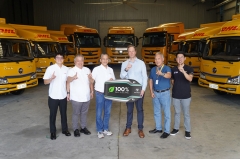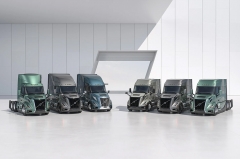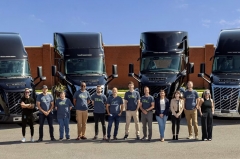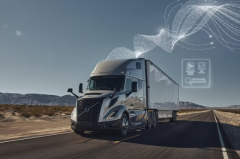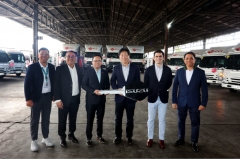
As part of the U.S. Department of Energy's Vehicle Technology Office-sponsored Battery Efficiency for Sustainable Trucks (BEST) project, Volvo Trucks North America is collaborating with the University of Minnesota (UMN), Murphy Logistics Solutions, and HEB Grocery Company in Texas to conduct rigorous temperature testing on its Class 8 VNR Electric trucks. The objective is to evaluate the performance of these electric trucks under extreme temperature conditions.
Murphy Logistics Solutions and HEB Grocery Company will deploy battery-electric trucks on freight routes that surpass 402 km per day. These trucks will be operated by drivers from their respective fleets who have received training from Volvo Trucks' electromobility team. The training will focus on employing regenerative braking and other safe driving techniques that optimize the vehicle's range. Each day, the VNR Electric trucks will commence their journeys with a fully charged battery or 100 percent state of charge and ideally complete their routes with a significantly depleted battery. This approach ensures that the usable energy within the battery is fully utilized during the day's operations.
“This research project is a critical step to ensuring the efficiency and reliability of Class 8 battery-electric trucks regardless of the environmental factors. The results of this testing can be expected to bolster fleets’ confidence in the Volvo VNR Electric trucks’ reliability and performance in all weather conditions while still providing the creature comforts for drivers.”

In a similar manner to battery-electric passenger cars, heavy-duty battery-electric trucks may experience decreased range in extreme temperatures hence the need for rigorous testing. This is attributed to battery chemistry, where the chemical and physical reactions within the battery can slow down, thereby reducing the range of an electric vehicle (BEV). To address this issue, the Volvo VNR Electric model incorporates a dedicated Battery Thermal Management System (BTMS) designed to regulate and maintain the optimal temperature range for the battery.
The BTMS serves as a specialized heating and cooling system that is directly linked to the batteries. Its primary purpose is to prevent the slowdown of chemical reactions or potential damage to the cells during extreme weather conditions. By ensuring the batteries operate within the ideal temperature range, the BTMS can draw out a long life and consistent performance from the batteries across a range of weather conditions encountered during real-world usage.
Another factor that Volvo considers is the use of auxiliary power for temperature control within the passenger cabin. When the ambient temperature is higher or falls below the average home temperature of around 21 degrees Celsius, drivers are more inclined to activate to turn on the heater or AC which draws energy from the vehicle's battery.

Apart from the rigorous weather testing, the University of Minnesota has developed an Intelligent Energy Management System (EMS) that offers a connected solution tool. This tool assists fleets in understanding how driving style can impact the vehicle's range and provides guidance on leveraging more energy-efficient routes. It also helps reduce the cost and time associated with on-route battery charging. Employing a machine learning-based algorithm, the tool actively informs drivers about available range and minimum charging requirements while considering factors like load and ambient conditions. The EMS further enhances efficiency and extends the range through advanced eco-route planning. To date, the implementation of the EMS tool has aided Murphy and HEB in achieving a remarkable increase of over 20 percent in their vehicle's range.
Upon the conclusion of the research project conducted in both climates, the University of Minnesota plans to publish the findings through a series of conference presentations and journal papers. Furthermore, UMN will share the obtained information with the U.S. Department of Energy (DOE) and Volvo Trucks by preparing a final project report.



